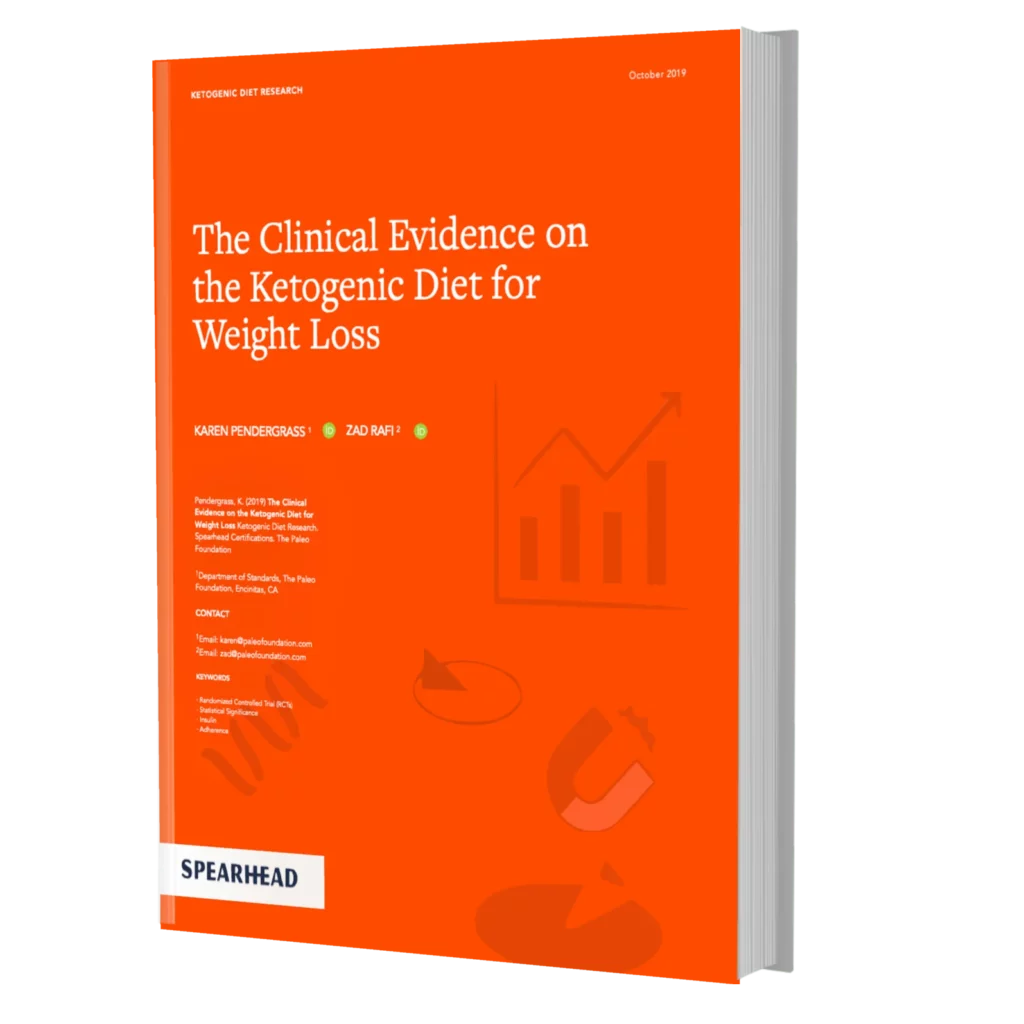comparable and so that all the associated character-istics of the recruited participants are distributed randomly. [3]
A search of MEDLINE (the database run by the National Library of Medicine, which indexes articles from scientific journals) shows that the number of randomized trials done on the ketogenic diet for weight loss has also increased over time. [Figure 1]

2 | WHAT DO RCTS SAY ABOUT THE KETOGENIC DIET FOR FAT LOSS?
It’s important to point out that differences in weight loss do not distinguish differences in lean mass and fat loss. This is worth noting since carbohydrate restriction depletes glycogen stores (part of lean mass), which results in weight being lost, but not necessarily fat. [4]
Thus, it is critical to also look at the differences in fat mass which are often measured by various other methods such as DXA scans.
Another common limitation in weight loss research is not matching for energy or protein. For example, if participants in the ketogenic diet group ate substantially fewer calories for some specific reason, and this isn’t taken into account, then it will be difficult to conclude that the ketogenic diet exerted a unique metabolic effect that drove fat loss when reduced caloric intake was the true driver. Thus, matching for calories and other characteristics of an intervention, such as protein content, is vital to interpreting the utility of the findings.
Brehm and colleagues found in two trials, one done in 2003 and another in 2005, that when matched for calories, the ketogenic diet still resulted in more fat loss than the control groups, so it is possible that there may be a metabolic advantage to going on a ketogenic diet. [5, 6]
Another trial by Brinkworth and colleagues that also matched for calories found that the ketogenic diet group experienced more fat loss than the control group. [7] Though it’s worth taking into account that these studies were also done on an obese population and did not match for protein content.
However, the evidence on the superiority of the ketogenic diet for fat loss when matched for calories is mixed, since some studies have also failed to show a statistically significant difference in fat loss. [8-10]
In four trials that matched for protein intake and caloric intake between groups, there were no statistically significant differences in fat loss, thus any unique advantages attributable to the diet may be mediated by protein content, however, it is also possible that the lack of significant differences may also be a result of the low sample size. [11-14]
3 | WHY DOES THE KETOGENIC DIET WORK FOR WEIGHT LOSS?
INSULIN
There are several debated mechanisms as to why diets that restrict carbohydrates result in weight loss, and many proponents of the carbohydrate-restricting diets argue that the primary benefits of such diets are metabolic advantages that are a result of reducing in insulin, which they believe to be the primary hormonal driver of fat storage. [15]
Many of these hypotheses are controversial, and studies that have investigated some of these mechanisms have shown mixed results, with the most recent support for the hypothesis coming from a Mendelian randomization study.[16]
HUNGER
Several trials report that participants feel less hungry and more satiated on the ketogenic diet. This may be due to the increased protein content in the diet, since protein is known to be one of the most satiating macronutrients. [17, 18]
However, many ketogenic diets that are also low in protein still result in a satiating effect. [19] So, while protein could contribute to a satiating effect, it does not seem to be responsible for all the satiating effects of the diet.
One systematic review hypothesized that the increased satiety was a result of increased levels of ketone bodies in the blood, and one article hypothesized that ketone bodies can change the structure of various hormones involved in the regulation of hunger. [20]
The satiating effects of the ketogenic diet could be driving the main advantages of the diet, which lead to lower caloric intake and thus, more fat loss.
ADHERENCE
It’s well known that most diets have poor adherence rates, making it difficult to sustain and maintain weight loss over a long period of time, despite seeing benefits initially.
With regards to the ketogenic diet, adherence rates from individual studies do not seem to suggest that there is much of a difference between dropout rates in the keto group and the control group, however, this may need to be investigated in a formal quantitative review like a meta-analysis or systematic review.
An informal meta-analysis by Sci-Fit found that there was no large difference in the odds of dropping out in the ketogenic diet and the control group. [Figure 2]
CONCLUSION
Thus, the clinical research for the ketogenic diet and fat loss is incredibly promising and this may be due to the satiating effects of the diet, the adherence rates, and a possible metabolic advantage that still need to be explored in larger studies where caloric and protein content are matched.




